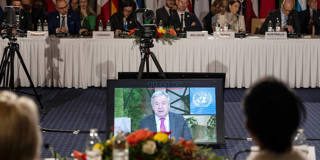While the outcome of the Ukraine war remains uncertain, the West’s strategic aims, particularly how it intends to treat Russia in the event that Ukraine prevails, will have huge consequences. At stake is whether victory leads to more inclusive and equitable multilateralism or strengthens autocracies and deepens global divisions.
WASHINGTON, DC – The Ukraine war and the world’s reaction to it will be a decisive factor in shaping the global political and economic order in the decade ahead. In particular, the Western allies’ actions, narratives, and planning regarding both Russia and the role of the Global South in Ukraine’s postwar reconstruction will indicate what their long-term strategic goals are. Does the West simply want to see Russia defeated and NATO enlarged and strengthened, or can it envisage a “victory” in Ukraine that lays the foundations for a world in which democracy is more secure and global governance more inclusive and effective?

WASHINGTON, DC – The Ukraine war and the world’s reaction to it will be a decisive factor in shaping the global political and economic order in the decade ahead. In particular, the Western allies’ actions, narratives, and planning regarding both Russia and the role of the Global South in Ukraine’s postwar reconstruction will indicate what their long-term strategic goals are. Does the West simply want to see Russia defeated and NATO enlarged and strengthened, or can it envisage a “victory” in Ukraine that lays the foundations for a world in which democracy is more secure and global governance more inclusive and effective?